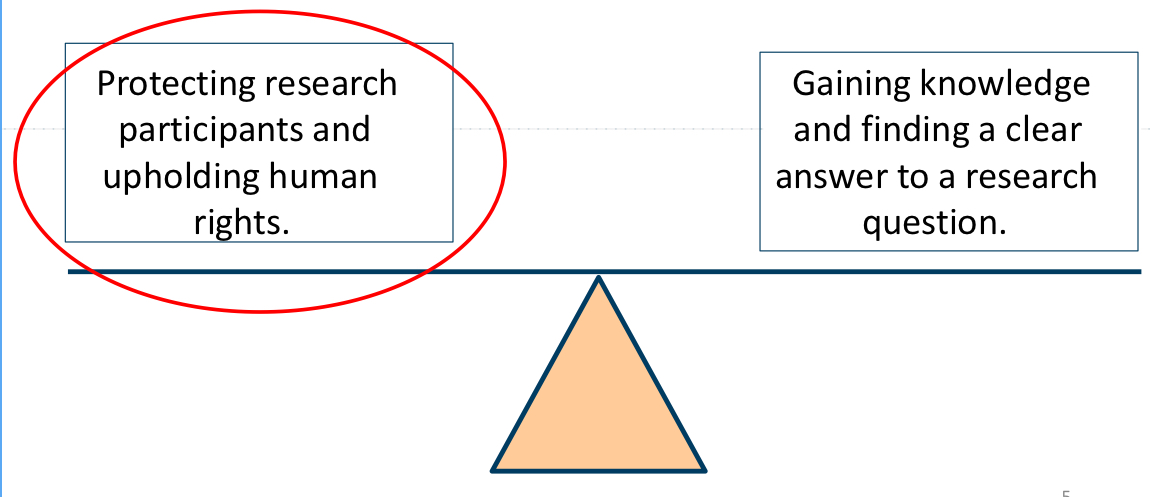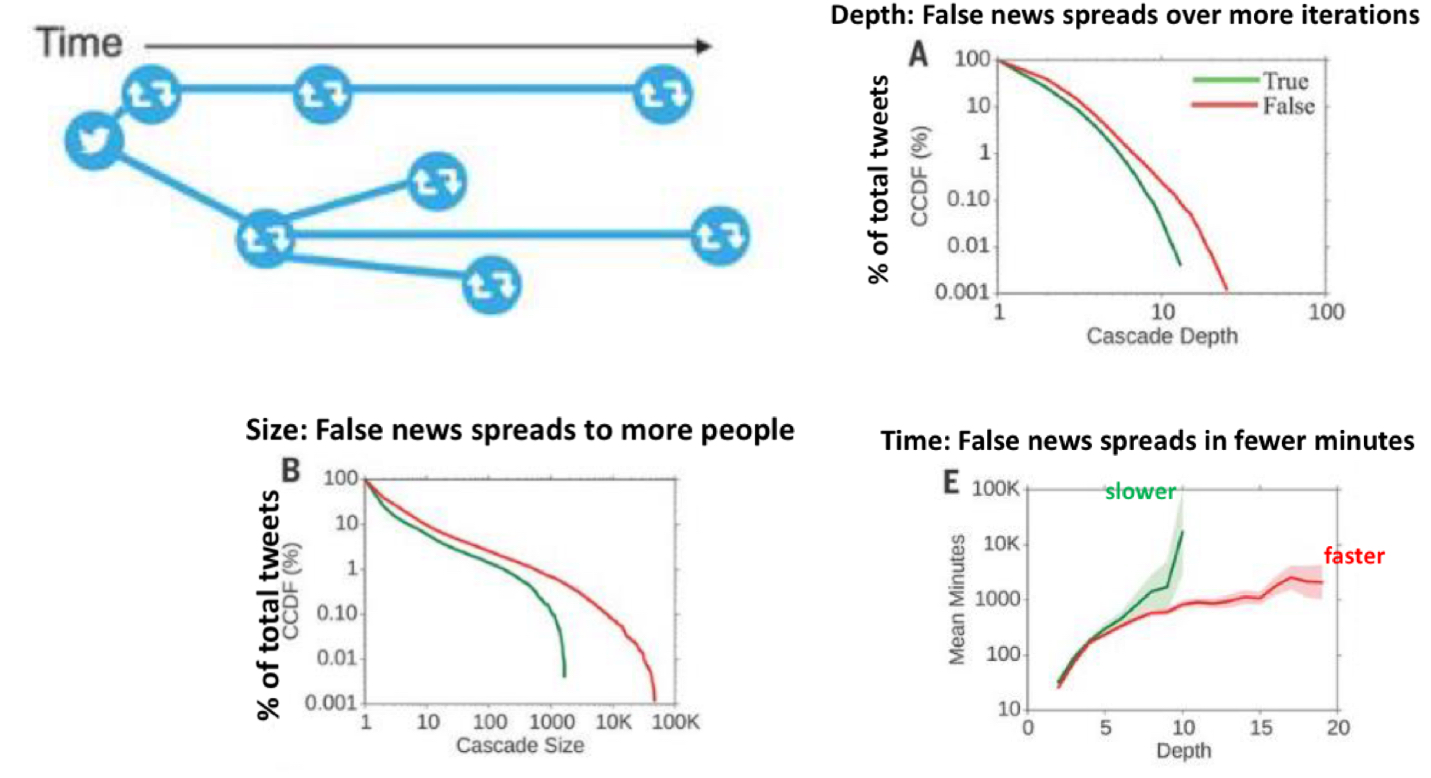Lecture 10: research ethics
1/72
There's no tags or description
Looks like no tags are added yet.
Name | Mastery | Learn | Test | Matching | Spaced |
|---|
No study sessions yet.
73 Terms
explain the Tuskegee study
participants were left with untreated syphilis to examine the final stages of the disease
to act ethically, what do you need to balance?
protection of participants VS knowledge you want to gain

define “research ethics”
responsibility of researchers to be honest and respectful to all individuals in their research and in their report
what do research ethics help us determine?
whether something is legitimate/moral or not
what do research ethics encompass? (5)
measurement techniques
participant selection
which research designs and strategies can be used with certain populations
how data is analyzed
how data is reported
why was the Nuremberg code developed?
it was a shift caused by the experiments performed on prisoners on Nazi camps
why is Milgram’s obedience study considered unethical even though it caused no physical harm to the participant?
it caused shame and embarrassment for behaving inhumanly towards other people
what are the guidelines of the Nuremberg code? (10)
consent
benefit of knowledge for society
knowledge or anticipated results
no unnecessary physical/mental suffering
no risk of death
risk must be lower than importance of problem
adequate facilities
competence of researcher
withdrawal is allowed
termination of study possible, by research or ethic boards
what are the core principles of Belmont report? (3)
respect of person: you should consent
beneficence: no harm = minimize risk and maximize benefits
justice: fairness in procedures for selecting participants
what are the core principles of the TCPS? (3)
respect for persons: participant participates only if they wish to
concern for welfare: not exposing participants to unnecessary risk
justice: treat everyone equally (no discrimination when choosing participants)
true or false: only the psychologists on clinal work should follow the Canadian code of ethics for psychologists
false: it applies to all psychologists (research, clinical, teaching)
what are the principles of the Canadian Code of Ethics for Psychologists (CPA)? (4)
respect for dignity of persons (most important): do no harm
responsible caring: maximize benefit, minimize harm
integrity in relationships: honest, minimize deception
responsibility to society: contribute to the society
explain the CPA principle of “respect for dignity of persons” (4)
do no harm
informed consent
protection of privacy
protection of vulnerable
explain the CPA principle of “responsible caring”
competence: maximize benefit and minimize harm
explain the CPA principle of “integrity in relationships”
accurate and honest: minimize deception and debriefing if it happens
explain the CPA principle of “responsibility to society”
contribute to psychology and society
what are the principles of informed consent? (3)
participants must be informed of what will be done and why
participants must have complete understanding
participation must be voluntary and not coerced
if you can’t give complete disclosure (you can’t tell them why you’re doing the study) before the participant consents, what should you do?
you should explain only explain what should be done, but not why
why can’t you tell the participant the goal of the study?
because it might change their behaviour
who are considered as vulnerable populations?
individuals who lack capacity for or full freedom to give true informed consent
true or false: the guardian’s consent is enough to determine if the vulnerable participant can participate in the study
false: if the participant is vulnerable, you should seek consent from the participant and the guardian
if you do observations in public spaces, what are the conditions needed so that consent is not required? (3)
no intervention staged by the researcher or interaction with the person
no reasonable expectation of privacy
dissemination of results that won’t allow identification of people
what do you need observational consent is there is “reasonable expectation of privacy”? what does that mean?
if you go to the store, you know that there are security cameras that are observing you, you don’t expect privacy (wouldn’t need observational consent)
if you go inside the bathroom, you expect privacy (would need observational consent)
define “deception”
not giving participants complete and accurate information
what are the types of deception? (2)
passive: leave out some information
active: alter information or use confederate
define “passive deception”
leaving out information, not actively lying
define “active deception”
alter information or use confederates, actively lying
true or false: deception is always rejected by the research ethics board
false: you would need to consider alternatives and justify why you reject them before the REB approves
what type of information can you NOT conceal, even when using deception? (2)
physical pain and severe emotional distress
what should you do if you used deception?
debriefing: explain why you had to deceive the participant before they leave the lab
define “confidentiality”
keeping all individual information obtained during a study in a private and secure location
define “anonymity”
data isn’t associated with participant names or identifying information
what’s the difference between confidentiality and anonymity?
confidentiality: you keep the information about the participant private (ex: master record)
anonymity: data isn’t associated with names or identifying info (ex: sample 2 - dyadic interaction)
how can you keep anonymity?
by using code numbers (ex: FTF059)
if only group data is reported, then it’s [good/bad] for confidentiality and anonymity
good
when can anonymity be broken?
if it’s a special medical/neuroscience case where the case is repeated across multiple studies (ex: HM)
why do we do research of animals? (4)
learn about societies
learn about humans
learn about behaviour
conduct research that are impossible to do with humans
what are the principles when reviewing animal research? (3)
replacement: could you try replacing animals with an alternative
reduction: could you try having less animals involved
refinement: could you try modifying procedures to minimize distress or stress
what’s the difference between a mistake and a fraud?
mistake: unintentional, can correct with an erratum
fraud: effort of researcher to falsify or misrepresent data, possible retraction
what are some possible frauds? (4)
data fabrication or falsification of findings
plagiarism of sources
ghost-writing and fake-peer reviews
suppressed findings
define “ghost-writing”
third party or comity that writes for you, but doesn’t get credit
true or false: if you make a mistake (in the conclusion or in the design) and publish the paper, then your paper will get redacted
false: you can publish an erratum, which is a follow-up where you explain your mistake
where can ethic violations occur during your experiment? (2)
data analysis
publication phase
(can be one or both)
define “scientific misconduct”
violating basic and generally acceptable standards of honest scientific research
define “suppressed findings”
doing your experiment multiple times until it reflects your hypothesis, but not mentioning your “failed” results in your paper
define “plagiarism”
using another person’s words or ideas without giving them credit and passing them off as your own
what are some safeguards against frauds? (3)
replication: repeat the experiment
peer review: have reviewers revise your work
watchdogs: have people that monitor and investigate research
how does the peer reviewing process work?
you submit your appear to a journal
it will be assessed by editors
then sent to peers (people with expertise on the subject) who can ask you to revise your work
you correct your work and send it back
if it’s okay, it will get published (after edition, formatting)
why do unethical research happen? (3)
publish or perish: career pressure to publish
must obtain significant findings to publish (or else it would be a waste of time and money)
need for success and admiration
what does “publish or perish” mean?
there is a career pressure to publish, gain prestige and keep your position as professor
true or false: information pollution increases you capacity to make informed decision
false: it decreases your capacity
define “disinformation”
information that is false and deliberately created to harm someone
define “misinformation”
information that is false, but not deliberately create with the intention of misleading or causing harm
define “malinformatiom”
information based on real facts, but manipulated to cause harm
what’s the difference between disinformation, misinformation and malinformation?
disinformation:
false information
created to harm
misinformation:
false information
wasn’t created to harm
malinformation:
based on true facts
manipulated to harm
define “cherry-picking”
presenting only the facts that support a certain view
define “double standard”
holding evidence that supports the scientific consensus to a higher standard than the evidence that challenges it
in other words: accepting evidence that isn’t scientific more easily than evidence that is scientific (ex: anti-vax)
define “reliance on false experts”
amplifying the opinions of a few scientists who challenge the consensus
ex: agreeing with a chiropractor on something about schizophrenia
define “conspiracy theories”
trying to explain harmful events as the result of the actions of a small powerful group
what’s the goal of conspiracy theories?
to make sense of social forces that are self-relevant, important and threatening
define “attribution error”
people overestimate causes that arise from human motives and underestimate causes related to situational factor
in other words: you think that behaviour are caused by the person and not by the environment
define “confirmation bias”
tendency to focus on evidence that fits with our existing beliefs
explain the experiment that showed the existence of confirmation bias
2 groups of students that either believed that
1) capital punishment would reduce crime rates
2) capital punishment wouldn’t reduce crime rates
students read 2 stories
A) story supports idea that punishment would reduce crime
B) story that supports idea that punishment wouldn’t reduce crime
rates their belief after reading the story
1) thought that A) was credible, but not B)
2) thought that B was credible, but not A)
→ both groups were more committed to their original perspective than earlier
what are the measures used to see how news spread? (3)
size: how many people it started with
depth: cascade of people (you send to your 2 friends who send it to 3 of their friends)
time: minutes elapsed

with the measures of depth, size and time, how did real news VS fake news spread?
depth: fake news spread more over iteration
size: fake news spread to more people
time: false news spread more quickly

why does false news spread more quickly?
echo chamber: people who share the same strong opinion are in the same group where they are exposed to the same content
define “source attribution”
users spread news more often from a trusted source than from a trust fact
according to source attribution, which is more important: who posted the news or what was said in the news
who posted it: source attraction = who prefer trusted source than trusted facts
define “spoofing”
disguising a communication from an unknown source as originating from a known and trusted source
define “caller ID spoofing’
deliberately falsifying the information shown on a phone caller ID display to disguise an identity
define “email spoofing”
email sent from a false sender address, asking for sensitive data
define “online news spoofing”
posting a fake news story on a fraudulent website designed to look legitimate
why does it take a long time for a restricted article to be recognized as false news? (3)
startling findings are more talked about than their restriction
follow up news on old topics is less interesting
some scientists didn’t read the retraction